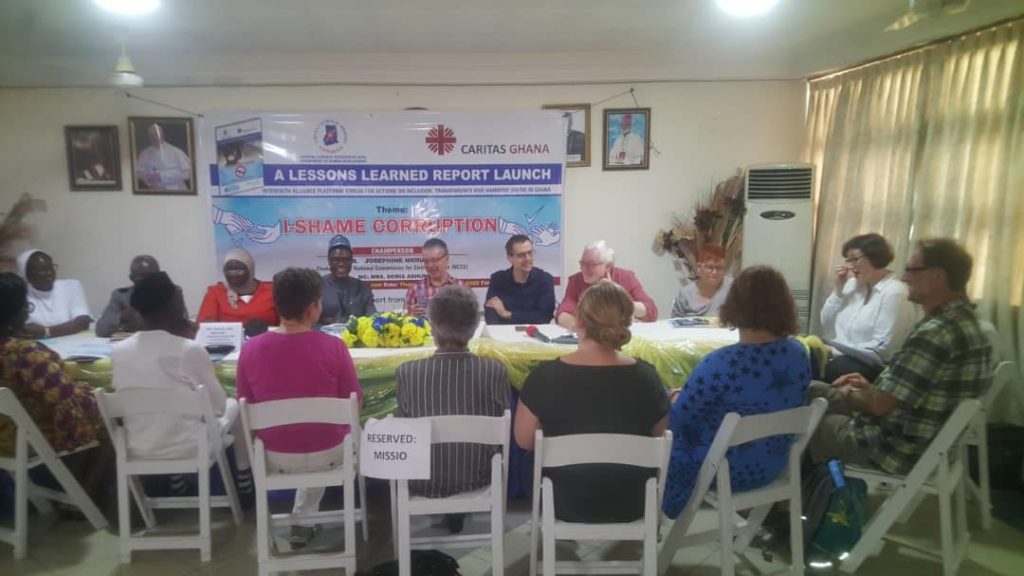The integration of the fight against corruption in the country’s basic school curriculum has been called for.
The call by the Transparency and Harmony (FAITH) in Ghana Alliance is believe to help create corruption awareness at the basic levels as well as instill into the pupils the spirit of eschewing corruption at their level.
The Faith-based Alliance made this suggestion known at the official launch of the “Lessons Learned Report on Anti-Corruption Campaign” under the auspices of the Interfaith Shaping Hearts, Attitudes and Mindset To End Corruption in Ghana (I-SHAME CORRUPTION), a chapter of FAITH in Ghana Alliance.
The I-SHAME secretariat was hosted by the National Catholic Secretariat of the Ghana Bishop’s Conference and led the consortium application for funds.
Speaking at the launch, the Executive Secretary for Caritas Ghana and Co-ordinator for of the Faith in Ghana Alliance, Mr. Zan Akologo explained that the call was occasioned by a results of a mechanism or model adopted by the Alliance where over 20 integrity clubs were formed at the basic school across the 10 old regions of Ghana.
Indicating that, these clubs received morality and integrity lessons from both religious Leaders and integrity club co-ordinators.
“In the last 24 months of implementing the I-SHAME Corruption in Ghana Project framework, a total of 3,856 direct and 32,000 indirect beneficiaries were reached through different mediums”, he stated.
The project framework according to him noted a remarkable improvement in pupil’s knowledge and attitudes on issues of bribery and corruption and their devastating effects on the lives of the citizens.
To asserted this improvement, he revealed that, the results was measured from inter-school knowledge sharing activities which took the form of debates, discussions, presentations and quizzes at the regional level.
This he stressed has made the project framework to be an effective approach to a long term fight against corruption in Ghana.
The I-SHAME Corruption Co-ordinator however pointed out that, the project can be assessed over a long term when pupils from integrity Clubs grow into adults and are engaged in gainful employment or in economic activities and practice what they have learnt over the years.
To this effect, he called with urgency the need to institute a long-term tracer system to monitor progress on each of the integrity Club members to ascertain their level of resistance to acts of bribery and corruption in their adult and working lives”.
Touching on the report He noted that, the lessons learned and best practices as contained in the report is presented in six sections stressing that, that chapter one gives an insight on the I-SHAME corruption in Ghana Project framework whereas the second chapter carries an extensive conceptual analysis framework on the project thematic area.
Whilst the third chapter, outlining the methodology deployed to execute the project actions.
The I-SHAME Corruption in Ghana project Mr. Akologo revealed instituted a mechanism for the collection and distillation of key lessons learned to inform future project design as well as contributed to existing knowledge in the fight against the evil of bribery and corruption in Ghana.
Adding that, the lessons that were captured after the 24 months of implementation include the potency of integrity clubs to the sustainable fight against the evil of corruption and bribery in Ghana, shaping the minds and hearts of basic school pupils at the early age.
This he noted is most effective in building their adult life that, FAITH in Ghana Platform should neutralize violent extremism among others.
On his part, the Executive Secretary of Caritas later outlined the recommendations to Ghana Education Service (GES) in the lessons learned report which includes Integrate the activities of the integrity clubs into the curriculum of basic school, Institute a tracer system to track all integrity club members; Continue the consolidation and formalization of the FAITH in Ghana; Explore core funding opportunities for the consolidation of giants and project expansion beyond 20 basic schools among others.
“The I-SHAME corruption in Ghana Project has made a significant contribution towards the elimination of the fundamental causes of corruption in Ghana by investing in structures and systems that put integrity building and morality at the heart of the upbringing of basic school children in Ghana.
Source: www.thenewindependentonline.com/ Ishmael Barfi/ senghana@gmail.com








